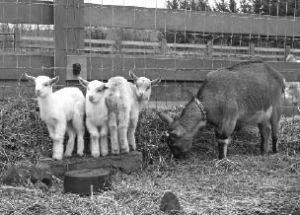Baby goats, baby animals of any kind, are so cute. Watching them frolic about this time of year, it’s easy to assume that everything else about them is just as carefree.
Often it is – easy births, rapid growth, no serious mischief – but as I learned talking with WSU Extension Ag Education Coordinator Candace Jagel, who has raised goats for a number of years and believes that they are a perfect small-farm animal, “it can be nerve-wracking to keep farm animals. The responsibility doesn’t go away.”
To lessen the anxiety, there’s ongoing educational support like the WSU Extension Master Goat Farmer Training that Candace organized last October. And outside the calm of the classroom, during a difficult birth or when there is a sick animal, there’s the network and immediate support of veterinarians, mentors and other farmers who provide crucial relief and a listening ear, as Candace experienced firsthand this spring.
“I organized the Master Goat Farmer Training out of my own personal desire to know more,” Candace explained. “And I knew that there were others like me. I just didn’t know how many!”
Of the 23 San Juan County residents who attended the training, most were interested in dairy, with several looking at goats for meat and fiber. “We had a great three-day class with WSU specialists Gary Frederick and Dr. Susan Kerr on topics like forage and health. We also had speakers Tammy Dunakin, who runs a weed-eating goat business, Rent-A-Ruminant, and cheese makers Jason Drew of Steamboat Island Goat Farm and Rhonda Gothberg of Gothberg Farms. It’s important to hear about the successes and failures of others because if you can’t make your operation self-sustaining, you won’t be in farming for long. And to make it all concrete, we visited Layne Sundberg of Quail Croft Farm who raises goats and makes cheese here on San Juan Island.”
Right now, Candace is also tending to her own herd of goats. Her doe Snowberry had an easy birth of three kids. But another doe, Blackberry, was carrying four kids and collapsed just before she was due. She needed a C-section. Veterinarian Susan Besel delivered the kids, while five assistants worked heroically throughout an evening to resuscitate them. Two of the kids ultimately died of Floppy Kid Syndrome, which Candace diagnosed with the help of a mentor and then treated in the surviving kids using simple baking soda. Then she lost Blackberry, who failed to recover from the C-section. Candace has two other expectant does.
“The whole thing reminded me of shepherd Gabriel Oak in Thomas Hardy’s Far From the Madding Crowd,” Candace said. “When a young herd dog drove his flock over a cliff, that ended Gabriel’s first dream of a farm and sent him off to work as a hired laborer. Okay, melodramatic. But what do you do when you’re out of options? When there’s no one to help feed orphan kids or nurse a sick animal back to health? When you can’t afford a vet? When you work an off-farm job and your colleagues don’t understand? If these animals are your livelihood, then each loss affects the bottom line. And there’s an emotional toll.”
“My animals are not my income, though that was my goal. I realize better now how farmers live close to the edge, and I feel the need to honor our farmer support systems: the vets and vet assistants, the Extension specialists, the farmer mentors with their years of wisdom and experience, and the friends of farmers in this community who understand and lend a hand. They are the village it takes to keep our farmers going.”




